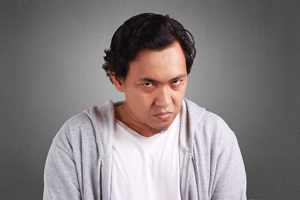
If you have a sociopath in your life for any significant period of time, whether as a romantic partner, family member, friend or business associate, here’s what you need to understand: You will be damaged. These people are manipulators and exploiters, and their predatory behavior is intentional.
Oh, they may say it’s not their fault. They may try to make you feel sorry for all the bad things that have happened to them in the past (which may or may not be true). Or they’ll blame others for anything that goes wrong. But make no mistake — these are simply tactics to achieve their objective, which is to use anyone and everyone who can provide something that they want.
“A sociopath is someone who preys on and/or damages nearly everyone they spend time with,” explains Dr. Liane Leedom, who is a psychiatrist and a professor of psychology and counseling at the University of Bridgeport.
These people know exactly what they are doing.
Dr. Leedom explains all about sociopaths and their behavior in the FREE Lovefraud webinar, Your first step towards real recovery from narcissistic abuse and trauma. If you’re still struggling to understand how the sociopath in your life could so callously do whatever he or she did, watch the webinar.
“Sociopath” — an umbrella term
First of all, what do I mean by a “sociopath”?
The word “sociopath” was once an official clinical term, but it no longer is. I use “sociopath” on Lovefraud as an umbrella term for people who have serious personality disorders in which they manipulate and exploit others.
They are often people who could be diagnosed with psychopathy or antisocial, narcissistic, borderline or histrionic personality disorder. These are the Cluster B personality disorders of the DSM-5, which is the manual for psychiatrists and other mental health professionals.
Dr. Leedom agrees with referring to human predators collectively as sociopaths. And she says sociopaths have psychopathic personality traits. What does that mean?
Two clusters of psychopathic personality traits
Researchers have identified two clusters of psychopathic personality traits, which are called Factor 1 and Factor 2.
Factor 1
- Glibness and Charm
- Grandiosity and Entitlement
- Conning and Manipulative
- Pathological Lying
- Lack of Remorse and Guilt
- Shallow Affect
- Lack of Empathy and Callousness
- Failure to Accept Responsibility
Factor 2
- Need for stimulation
- Impulsivity
- Poor Behavioral Controls
- Irresponsibility
- Parasitic Lifestyle
- Lack of Realistic Goals
- Criminal Versatility
- Violation of Conditional Release
- Juvenile Delinquency
- Early Behavioral Problems
Other traits
There are two additional personality traits which correlate fairly evenly between Factor 1 and Factor 2. They are:
- Sexual Promiscuity
- Short-term Marital Relationships
Narcissistic, antisocial and psychopathic personality disorders
In a particularly fascinating part of the webinar, Dr. Leedom explains how certain combinations of the psychopathic traits are associated with different personality disorders.
For example, someone who has just the Factor 1 traits, including glibness, charm, pathological lying and lack of empathy, would probably be diagnosed with narcissistic personality disorder.
Read more: Range of sociopathic behavior — from sleazy to serial killer
But a person who has the Factor 1 traits plus the Factor 2 traits, such as poor behavior controls and a parasitic lifestyle, would be probably diagnosed with antisocial personality disorder.
It is possible for people to have multiple Cluster B personality disorders at the same time. When that happens, they probably would be diagnosed with psychopathic personality disorder.
So as you can see, there is a lot of overlap among the disorders. That’s why I refer to them collectively as sociopaths. To protect ourselves, we need to know that people who live their lives by exploiting others exist. For those of us who aren’t therapists trying to treat the disorders, knowing a predator’s diagnosis is interesting, but doesn’t really matter.
Sociopaths do not take care of others
What causes Factor 1 and Factor 2 traits and behavior?
Dr. Leedom emphasizes that sociopaths are absolutely unable to love. They are also obsessed with power and dominance. This combination means they really do not care about other people.
Many species in the animal world, including humans, take care of others. Mammals nurse their young. Mother birds feed worms to their chicks.
But there are always some creatures who cheat. Cowbirds, for example, lay their eggs in the nests of other birds, like sparrows, so that the other birds do the work of raising cowbird chicks.
Among humans, the cheaters are the sociopaths.
In most people, the social motivations for love and power are balanced. But because sociopaths do not have the ability to love, their power motivation takes over their personalities. And this obsession with power and control, Dr. Leedom says, causes their psychopathic behavior.
Designed by nature
About 12% of humans are likely sociopathic, according to Dr. Leedom. So about 88% of people have the normal human ability to love and take care of others. The remaining 12% do not. In these people, the drive for power and dominance takes over the personality so they view others simply as objects to be used.
“They do not take care of other people,” Dr. Leedom said.
Some psychologists view this as a life strategy. The exploitative behavior of sociopaths is purposeful and it not an accident.
“These people are designed by evolution to behave the way they behave, and they are exquisitely designed for that purpose,” Dr. Leedom explained. “The evil they do is remarkable in its scope and how it’s executed.
“Evolution or adaptation has designed this group of people for this predatory purpose. And if you understand that, it can help you detach from it a little.”
Learn more about why sociopaths are evil
Dr. Leedom explains more about why sociopaths do what they do in this webinar. She helps you understand that the sociopaths’ predatory behavior is intentional. Our goal is for you to realize that sociopaths are what they are. They are built to be human predators. And there’s nothing you could have done to make them treat you any better.
This introductory webinar is the first in the six-part series, Skills for recovery from narcissistic abuse, gaslighting and toxic stress, presented by Dr. Liane Leedom. It is the only protocol specifically designed to teach you the skills to recover from narcissistic abuse.
If you’ve been damaged by a sociopath, you’re the one who has to recover. No one can do it for you. Dr. Leedom teaches you exactly how to do this, and the first webinar is FREE. You’ll learn what happened to you and how to move forward. We invite you to sign up now.
Learn more: FREE! Your first step towards real recovery from narcissistic abuse and trauma




































 Breaking the compulsion to “fix” and “help”
Breaking the compulsion to “fix” and “help”